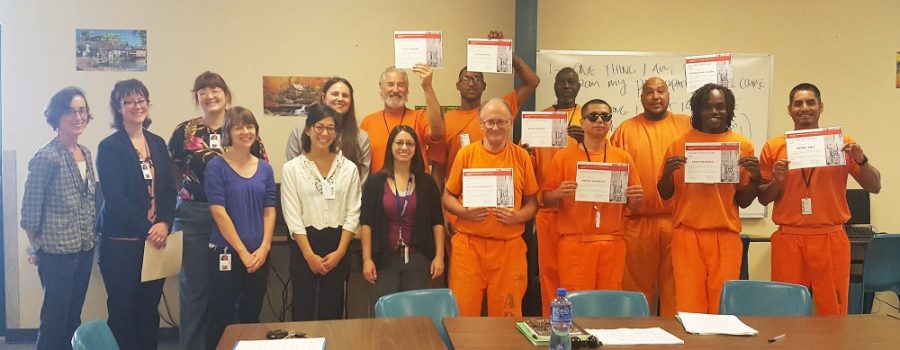Around 15 penitentiary inmates from an Arizona prison complex in Tucson are now attending writing and literary courses, thanks to Prison Instruction to Change Minds, a recent outreach initiative of University of Arizona’s English Department.
PRISM, who is changing its name from The Prison Education Project, provides education to incarcerated individuals in the Tucson area, raising awareness of social justice issues on the local and national level, based on the belief that education is a right for all people.
The project’s mission, according to the English department’s website, is to help improve students’ critical thinking and comprehension skills, gain rhetoric awareness and engage with readings to reflect on their lives and hopes for the future.
“Part of the overall purpose of the program is to reach out to a community that is underserved and give them a sense of purpose—that they are doing something constructive with their time,” said Marcia Klotz, project director and assistant professor in the department of English. “There is something profound about having that kind of interaction, being able to come into a group that has such a deep appreciation for what you are able to help them with.”
Two faculty members and 11 graduate students are currently teaching at the Whetstone Unit in the Arizona State Prison Complex on Wilmont Road every Wednesday morning.
RELATED: UA assistant “Book” Richardson among several arrested in FBI corruption scheme
This fall course, which began Oct. 4, is not for academic credit. Participants are instead awarded certifications of completion.
“I would love to have these classes count for credit,” Klotz said. “That’s the long-term goal.”
Prisoners who have a high school diploma or a General Educational Development certificate are eligible to register for the project’s classes.
Tucson housed 4,963 inmates in September, based on Arizona Department of Corrections’ Institutional Capacity and Committed Population records. As of last month, 2,230 of them meet the PRISM qualification within Whetstone and Catalina facilities combined.
According to Correctional Officer Melanie Yubeta, Whetstone currently accommodates 1,198 prisoners.
Bryan A. Smith, a UA psychology graduate of fall 2012, is a mitigation specialist for the Pima County Public Defender’s Office and a former inmate. In addition to Smith’s armory and attempted robbery conviction in 1982, under California’s felony-murder rule, he was also charged of second-degree murder and attempted murder.
During Smith’s imprisonment at San Quentin State Prison, in which he served almost 26 years of a life sentence, the 55-year-old earned an Associate of Arts Degree in 2003 from Patten University through Prison University Project, the state’s education outreach organization.
“I grew up in a lower middle-class working family,” Smith said. “I’m the fourth out of five children and I was the first to get a college degree.”
According to Smith, many incarcerated individuals felt, or feel, academically inadequate and “that college is not for them.” Since he, too, was under this perception before and during imprisonment, Smith conducts local motivational talks to help inmates understand that their beliefs about their academic abilities are not accurate.
“Growing up, I never thought I’d be able to get a higher education,” Smith said. “But I realized at some point that, ‘I’m going to graduate. I’m going to get a degree.’ This energized my future and opened up my world.”
Barbara Martinsons, a Tucson snowbird who leads a women’s prison project in upstate New York, donated over $25,000 to the university’s English department earlier this year to jump-start PRISM. Martinsons shares the project team’s passion for advancing education and supports community engagement within the U.S. prison systems.
RELATED: Local group holds vigil for DACA
Colleen Lucey, an assistant professor in the department of Russian and Slavic Studies, Klotz and 5 graduate students started this prison education program last spring when they taught incarcerated veterans during a preliminary 10-week course at Whetstone’s “Regaining Honor” subdivision.
After Lucey and Klotz circulated an informal sign-up sheet within Whetstone for spring and fall 2017 enrollment, the team reluctantly decided to cap acceptance to less than 20 participants each term.
“We would like to expand [the program],” Klotz said. “There’s a lot more interest than we are able to accommodate.”
PRISM plans to enlarge the spectrum of educational opportunities for inmates next semester by inviting any retired, or current, UA faculty to guest lecture for a day. According to the team, the intention is to expose the men at Whetstone to a range of available college classes, in case they choose to pursue college upon release.
“The reason why I am an activist for education in a prison system is because it is a very strong activity for personal transformation,” Smith said. “Taking those preparatory classes, getting the individual help, seeing my peers do it and the environment [all] helped me grow to learn about myself.”
Follow the Daily Wildcat on Twitter









